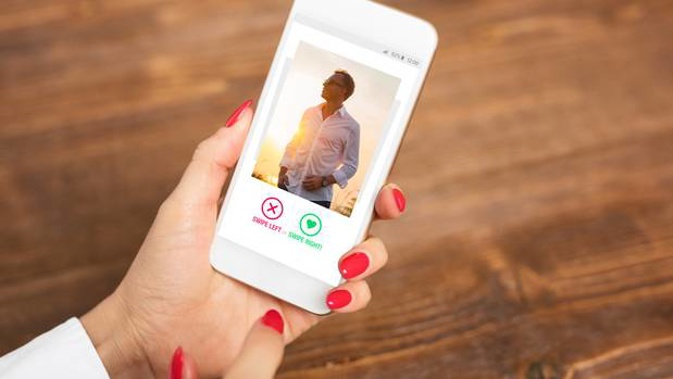
A Christchurch woman raped by her Tinder date has spoken out about her ordeal in a bid to prevent others becoming victims. Her attacker refuses to acknowledge his crime - still claiming after a year in prison that he "misread" her body language and did not realise her cries of "no" actually meant no. The Parole Board says this makes him a danger to women everywhere.
A Christchurch-based Brazilian man who raped his Tinder date - claiming he didn't realise her repeated cries of "no" were a signal for him to stop - will stay in prison because he is a danger to other women both in New Zealand and overseas.
Fernando Do Nascimento Barbosa continues to justify his attack, claiming he "misread" the situation and New Zealand culture.
But his victim has spoken out saying he knew exactly what he was doing - and she wants other women both here and overseas to know his name and face so they are not harmed when he is eventually and inevitably released.
"I don't think he is a safe person to be released - he just doesn't care," she explained.
"He's not done any work to show that he is rehabilitated and he still doesn't think he's done anything wrong.
In late 2018, Barbosa was living in Christchurch and matched with a woman on Tinder - an online dating application that allows users to anonymously swipe to "like" or "dislike" others based on their photos.
They messaged for a while, got to know each other and made arrangements to meet at a city shopping centre.
Barbosa then invited the woman to come to his home, telling her he had been doing some gardening work and wanted to show her.
She agreed to go, feeling comfortable given the pair had been communicating for a while.
When they got to his house Barbosa led the woman to his bedroom and according to the police Summary of Facts presented to the court, he "made a move on the victim".
"The victim pushed him away and said 'no'," the summary said.
"[Barbosa] asked the victim if she wanted sex and she replied 'no'.
"He asked for a reason why she didn't want to, to which the victim said she just didn't want to.
"The defendant told her to remove her clothing and when she didn't he removed the
victim's clothing from her."
Barbosa then forced himself on her and told her "what he was doing was okay".
"The victim began pushing the defendant back saying to him 'no, no, no'," police said.
Barbosa only stopped when he saw the woman - struggling to get away from him from the outset - was crying.
He asked the victim why she was crying and she told him again that she didn't want to have sex with him.
Barbosa offered to drive her home but the shaken woman refused and called a friend to pick her up.
When spoken to by police, Barbosa admitted "having sex" with the victim but claimed he "immediately stopped" when he heard her protests.
/cloudfront-ap-southeast-2.images.arcpublishing.com/nzme/YKGFK5COMTADT2G4GZNPBKMRLE.jpg)
Some Tinder users engage in sleazy behaviour. Photo / Getty
Barbosa denied two charges of sexual violation and rape - claiming he believed the woman had consented - but was found guilty by a jury after a trial in the Christchurch District Court last year.
In December, Judge Raoul Neave sentenced the rapist to three years and four months' jail.
He blasted Barbosa, saying the woman saying no "ought to have been enough".
"You ought to have realised that she simply was not consenting to what you ultimately did," he said.
Judge Neave accepted Barbosa's claim that he "may have misread the situation" and was "used to dealing with" women who "expressed themselves more forcefully".
"That does not excuse or condone your behaviour," he said.
"On one hand I have to balance the fact that a young lady has been subjected to a very difficult and painful experience that has left her with emotional scars … but I am also highly conscious that you too are a young man whose life has been ruined and who, I think, found yourself in a situation which you just did not properly understand," he reasoned.
A pre-sentence report suggested a lack of remorse from the convicted rapist.
That attitude was echoed by the Parole Board when he became eligible for consideration of an early release from prison last month.
"[Barbosa] was asked about what he thought the impact of his offending may have on his victim," Parole Board panel convenor Martha Coleman said.
"He proceeded to justify that offending.
"He said that it had happened only two months after his arrival. He said that he did not understand New Zealand culture and misread the signals.
"While he accepted that she said no, he said that her body language told otherwise."
Barbosa further told the board that in Brazil "her behaviour would mean something different".
When Barbosa is released - either on parole or at the end of his sentence in late December 2022 - he will go straight into the custody of police or Immigration New Zealand until he can be deported.
Coleman said the board was "very concerned" at the way Barbosa spoke about the offending.
"We were left with no confidence that he really has accepted that what he did was in any way unlawful let alone wrong," she said.
"It left us with no confidence that he would not be a risk to the safety of young women in Brazil were he to return.
"The board may not release him until it can be satisfied that he would not pose a risk to either community."
Coleman requested a psychological assessment of Barbosa to determine his risk level to be completed for the board ahead of his next hearing.
"Until the board has that assessment we cannot be satisfied that his risk is other than undue," she said.
Barbosa will stay in prison until at least April, when his next parole hearing is scheduled.
The woman he attacked spoke to the Herald after the parole decision was released.
She said it was "scary" to think he could get out of prison and offend again and was worried women in his future would have no idea of what he had done.
"If someone can spend a year in prison and still not think they have done anything wrong - why wouldn't they reoffend?" she said.
"He will eventually be leaving to a different country and no one there will know what has happened and what he did.
"I just want people to know what he did and that it's not okay."
The victim initially did not intend speaking with the Parole Board before the hearing but she was terrified Barbosa would be released and get to stay in New Zealand because of the Covid-19 pandemic, which has resulted in strict restrictions on international travel.
She feared his deportation would be delayed and she might see him again.
"It will be a huge relief when he is deported but just because he can't hurt me again it doesn't mean that he can't hurt anyone else.
"That's really scary."
The woman said what happened to her - from the rape to the court process and the parole hearing - was "awful".
"It was a relief [that parole was declined], but at the same time it means it's not over for me yet," she said.
"It just brings it all back.
"Court was traumatising ... to be told that you are a liar in front of a whole room of people you don't know is just horrendous.
"The process was so awful, in some ways it was worse than the day everything happened - you're just dragged through every minute of it over and over, second by second.
"I was considered a 'witness' ... but this happened to me ... I didn't get to have a lawyer, I couldn't withdraw, I lost all ability to take control; he took control from me at that moment, and then everyone else took it away from me in court.
"It made me feel powerless … I stood there for hours being told I did the wrong thing.
/cloudfront-ap-southeast-2.images.arcpublishing.com/nzme/XJI5M2IYKFW6T4XM2HMVSIPLGE.jpg)
Barbosa, from Brazil, met the victim on a dating app. After they chatted for a while they agreed to meet. The same day he raped her. Photo / Getty Images
The woman said the court process was gruelling and she wished she'd never had to experience it, but encouraged other victims to come forward and hold offenders to account.
"It's the right thing to do to report things," she said.
The woman now knew she had done nothing wrong. From using Tinder to meeting him, she was a consenting adult who used her common sense.
"I thought it would never be me - I made really sensible decisions, it's not like I didn't know him before I met him in person," she said.
"I met him in a public place, I felt like I did all the right things.
"It's been a really long journey for me to accept that I didn't do anything wrong. It was him.
"It just goes to show what can happen, and that if someone wants to hurt you, they will find a way."
The woman said she was slowly rebuilding her life, confidence, power and strength.
"I just try and push through. I go to therapy, I have an amazing partner who is so supportive and he's been through a hell of a lot with me," she said.
The woman never wanted to see or hear from Barbosa again and was not sure if she would participate in future parole hearings.
But she had a final message for the convicted rapist.
"I just hope he never hurts anyone else," she said.
"I hope he learns from this, I hope he educates himself.
"I hope he realises that what was done, it's not okay.
"That's the hardest thing. He still doesn't see anything wrong with what he did."
Detective Senior Sergeant Anthony Tebbutt, who leads the national police adult sexual assault team, said there was no obvious increase in offending related to dating app usage.
He said while apps like Tinder and Bumble were growing in popularity, there was no direct rise in sex attacks.
"We don't keep statistics on how people meet, but dating apps are definitely more common out there with people meeting up through them," he said.
"As well as Instagram, Facebook, all of those social media apps.
"But we're certainly not seeing an increase in sexual assaults."
Tebbutt said in some ways, apps were safer than meeting people in other situations.
They allowed users to control their contact with a person and find out more about the other users before they made any decision to meet them.
He said safety advice around dating apps was simple.
"It's like anything, you can never be too safe," he said.
"Check the person out … let someone know where you're meeting them, and you don't have to go back to someone's house.
"It's common sense stuff."
Anyone who had been assaulted was encouraged to ask for help.
"We want them to come forward and report to police, we want to make sure we support them as best we can," he said.
SEXUAL HARM - DO YOU NEED HELP?
If it's an emergency and you feel that you or someone else is at risk, call 111.
If you've ever experienced sexual assault or abuse and need to talk to someone contact the Safe to Talk confidential crisis helpline on:
• Text 4334 and they will respond.
• Email [email protected]
• Visit https://safetotalk.nz/contact-us/ for an online chat.
Alternatively contact your local police station - click here for a list.
If you have been abused, remember it's not your fault.
Take your Radio, Podcasts and Music with you









